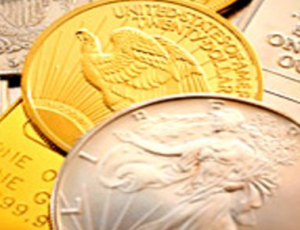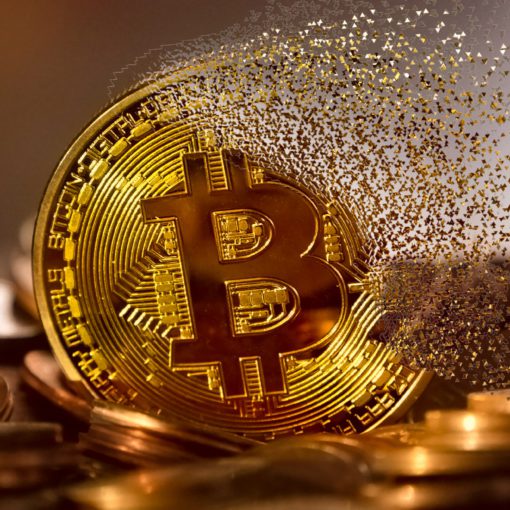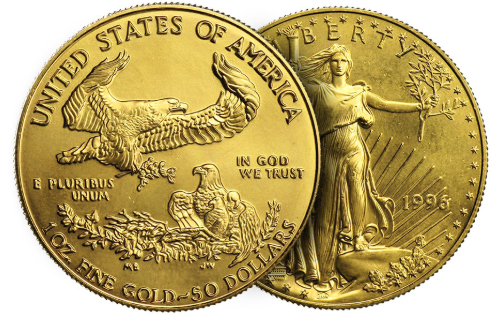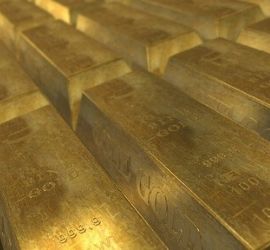Buy Gold or Silver Online – How to Invest in Gold and Silver
 So, you are considering investing in precious metals – How do you buy gold or silver online? Is there really much difference between gold and silver other than the price? Both are “precious” metals, meaning their occurrence in the earth’s crust is rare. But when it comes to investing, there are important distinctions. These differences should be understood and considered. Here are frequently asked questions regarding gold or silver for investment…
So, you are considering investing in precious metals – How do you buy gold or silver online? Is there really much difference between gold and silver other than the price? Both are “precious” metals, meaning their occurrence in the earth’s crust is rare. But when it comes to investing, there are important distinctions. These differences should be understood and considered. Here are frequently asked questions regarding gold or silver for investment…
Should I Buy Gold or Silver?
Gold and silver are two of the oldest forms of money in history. Industrial and personal wealth have been built on gold bars for millennia. Gold and silver are now valued as safe havens that protect against uncertainty. Buying online is fast, easy and uncomplicated. Many online retailers offer popular precious metal products that are available for delivery to the home. They can also arrange safekeeping in private safes worldwide.
Physical silver gives you the same benefits that gold offers as financial insurance. Silver is much more affordable for the average investor. Yet, it provides the same hedges and preservation of wealth as gold. You can buy small denominations of gold coins and bars (from half ounce all the way down to one-twentieth of an ounce in some cases). But, be aware that premium prices are charged for products less than one ounce. Silver’s advantage over gold is that you can capture all these same benefits but at a much lower cost. Your financial insurance is much more affordable with silver.
Here are 5 things to consider before buying gold or silver:
Silver Prices are More Volatile
 The annual gold supply is approximately 120 million ounces. In contrast, the total supply of silver per year is almost 1 billion ounces. On a first impression, it seems that the silver market is eight times larger than gold. On the contrary, the dollar value of the silver market is smaller than gold. This is because of the big price difference. The lower price of silver makes the value of the total market much lower than that of gold. The annual gold supply is almost nine times the size of silver on a dollar basis. Therefore, it takes a smaller amount of money to influence the price of silver over gold.
The annual gold supply is approximately 120 million ounces. In contrast, the total supply of silver per year is almost 1 billion ounces. On a first impression, it seems that the silver market is eight times larger than gold. On the contrary, the dollar value of the silver market is smaller than gold. This is because of the big price difference. The lower price of silver makes the value of the total market much lower than that of gold. The annual gold supply is almost nine times the size of silver on a dollar basis. Therefore, it takes a smaller amount of money to influence the price of silver over gold.
As a result, silver on the up days rises more strongly than gold. Silver on down days falls more heavily than gold. Investors call these price changes volatility. You have to be emotionally prepared for the higher volatility of silver. It is not good to buy the metal when you panic and sell at the first big drop. In fact, this volatility as an investor can be your friend. In the past, silver has fallen more than gold in bear markets. But it has risen more gold during bull markets. On a percentage basis, silver during bull markets is much stronger than gold. But silver in bear markets falls more sharply than gold.
Silver is More Affordable to Buy – and Sell
Put simply, there is less gold in the world than silver. Gold is the rarer of the two precious metals. Since there is less gold, the price is higher. However, silver is still a great investment. Its cheaper price should not fool potential investors. Since it’s cheaper, it’s easier to acquire silver and become an investor. The lower price point can also make it easier to buy more silver and possibly accumulate it. Silver has the advantage over gold that you can get all these benefits at a much lower price. Your financial insurance has become more affordable now. For the same reasons, silver is far easier to trade. The cheaper price makes selling simpler and to a larger potential customer base.
Silver Requires Much More Storage Space.
The affordability advantage comes with a catch. It takes a LOT more space to store silver than the equivalent dollar amount of gold. On average, the same dollar investment will give you about 80-90 times more ounces of silver than gold. In addition, silver is much less dense than gold. Pure silver is takes up almost 85% more volume than pure gold. These two facts together mean that silver needs up to 150 times more space than gold. This difference also applies to the transport of physical silver. It can be harder, more expensive and more cumbersome to store and transport silver over gold.
Silver has Greater Industrial Demand
 A little over 10% of the gold supply goes toward industrial uses. However, due to the unique properties of silver, well over half is used in industry. Silver has so many applications that you cannot go one day without using a product that contains it. From electronics and medical applications to batteries and solar panels, silver is everywhere. Why is that important? The situation of the global economy can influence silver demand more than gold. Silver is therefore more susceptible to economic booms and busts. The demand for industrial silver is high in a strong economy and weaker in a recession or deflation.
A little over 10% of the gold supply goes toward industrial uses. However, due to the unique properties of silver, well over half is used in industry. Silver has so many applications that you cannot go one day without using a product that contains it. From electronics and medical applications to batteries and solar panels, silver is everywhere. Why is that important? The situation of the global economy can influence silver demand more than gold. Silver is therefore more susceptible to economic booms and busts. The demand for industrial silver is high in a strong economy and weaker in a recession or deflation.
But that’s just part of the story. Unlike gold, most industrial silver is consumed and then thrown away (and in some cases destroyed during the manufacturing process). It’s just not economical to get every little flake or grain of silver from most products. If the product is thrown away, the silver is gone. This limits the amount of silver that can return to the market through recycling.
Silver Stockpiles are falling – Gold Stockpiles are Rising
This difference does not seem to be directly relevant to an investor. It is a behind-the-scenes development that can, under certain circumstances, have major consequences. Governments and other institutions used to have large reserves of silver. Today, however, most of them no longer have metal supplies. In fact, the only countries where silver is stored are the US, India and Mexico.
If the need for physical silver suddenly increases – a currency crisis, a lack of industrial supply, rising investment demand – governments will not be able to meet that need with no stocks on hand. This scenario would have a big impact on the silver market. Demand would rise and the price would skyrocket. This scenario may not arise, but it is a delicate position. It could have a profound and immediate impact on the silver market.
Physical Metal vs. Paper Metal Assets
An important decision during the initial investment process is whether to actually buy physical metals over paper metal assets. However, before you can make that decision, it is important that you understand what these terms mean and how they work.
Physical Metal
The term physical metal refers to gold or silver coins and bullion acquired by an investor who actually takes delivery. These metals are physically held by the buyer. Their use is restricted exclusively to the buying investor, who may sell or trade these items at his discretion. No third person or institution may have access to them. Physical metals have higher transaction costs than their paper counterparts. Yet, many investors consider them the only “real” way of holding precious metals.
Paper Metal Assets
By contrast, paper metal assets describe a situation where an investor has not purchased physical coins or bullion. Yet, he has documentation that demonstrates and confirms ownership of gold or silver in some form. There are many ways to invest in paper assets. One possibility is an exchange-traded funds (ETFs). In this case, a trust actually owns physical metals and allows investors to buy stock in the trust. Gold and silver mining stocks are another option that enable clients to buy precious metal stocks. Yet another way is to own options or futures contracts. These paper assets allow trades against gold or silver at a future date and at a specified price.
While paper assets offer lower transaction, there are many risks and disadvantages associated with these types of investments. With paper assets, the precious metals themselves are held or controlled by a third party. These companies or institutions provide limited access to investors. Should there ever be a financial crisis, these companies have the right to confiscate the assets. This leaves the investor with nothing but a piece of paper rather than a physical asset. For investors who want more security and personal control over their precious metal assets, physical metal investments are usually the better option.
Places to Buy Gold or Silver
The two most common places to buy gold or silver coins and bullion are from online retailers or a local coin stores. Local coin shops are almost as ancient as money. They developed from pawn shops to a more specialized form of resale shops. Local Coin deals provide customers with a place to personally view their items before making a purchase. By contrast, online retailers are obviously more of a recent development. They serve as virtual storefronts for precious metal companies and enable customers to shop online.
Should I Buy Gold or Silver Online or Locally?
Purchasing online or from a local coin shop is very similar in principle. You search their selections until you find goods that appeal to you, and then you pay for your purchase. However, there are significant differences between the practices of these businesses that can greatly impact both the purchasing and the overall customer experience.
Convenience
The most obvious difference between these two devices is the convenience. At local coin shops, customers are tied to a specific location they must visit before buying. In addition, customers who choose to buy locally will limit their purchases to the prescribed business hours of the particular store. In contrast, online retailers are available 24 hours a day and can be accessed from anywhere. This means that customers can shop and make purchases without any location or time restrictions.
Selection
Online shopping has a distinct advantage over a physical storefront with regards to selection. Local stores have to limit their choices to the tastes and preferences of a smaller customer base. Online retailers offer a variety of products to reach the thousands of customers who search their websites daily. Online shops also have an advantage over local shops because they offer enough space on their websites to showcase their large product range. Local businesses must limit their merchandise selection to the limits of shop windows and showcase space.
Competitive Pricing
Customers should always compare prices when investing in an asset like gold or silver. When you do, you will likely find that online retailers can typically offer more competitive prices than local coin stores. This price reduction is due to the fact that online retailers have to cover less costs. Virtual storefronts usually do not have the same costs that are incurred for in-store business, such as rent or utilities. This allows virtual sellers to pass on these savings to their customers and offer lower product rewards.
Safety
Perhaps the biggest and most important difference between these businesses is the level of security. Some might argue that buying gold or silver online poses a risk by not allowing a preview prior to purchase. However, customers are at a similar risk when shopping at a local coin shop. Yes, there may be a few less respected internet dealers who might try to mislead customers with their product descriptions. But these merchants are usually short lived. Internet rating systems and star reviews will quickly reveal unhappy customers and expose crooked dealers.
Many investors don’t realize that the majority of online stores work directly with the mints and distributors who produce their goods. This direct communication helps to insure that customers receive the original product. Many local coin shops also act as resale shops. When buying second-hand goods, they can not always verify the authenticity of their purchases before reselling them to their customers.
Confidentiality
Online retailers protect the personal safety of their customers by allowing them to remain anonymous. They can make their purchases in the privacy of their own home. Customers who make their purchases from local businesses have a bit more exposure. Once a potential customer visits a local coin store, others may notice and assume that the person now has something of value. This lack of privacy can turn them into potential targets for theft, burglary and even personal injury.
Buy Gold or Silver Online – Other Things to Consider?
1. You cannot examine the product
When buying online, you do not have an opportunity to physically see what you’re buying. Further, you don’t meet face to face with the dealer or inspect the business premises. You are totally reliant on the reputation of the dealer. This is why it’s important to thoroughly research the dealer before buying. Also, trade only with reputed and verified dealers. Maybe consider breaking up your purchase. Two or three smaller purchases will allow you to establish trust. Yet, you will be moving forward toward your investment objectives.
2. Your silver could be stored in a location out of your control
You can choose to take delivery of your gold or silver at your home. You can also have the dealer store the bullion at a secure location under their control. However, if you allow the dealer to store your bullion, you do not have physical access to your assets. You therefore cannot see or inspect what you have purchased. Delivery at home may incur extra charges, which may include the cost of insurance. These costs may be unrecoverable if there is a problem with the product.
3. Your payment details could be compromised
When you conduct any transaction via the internet, there is always a risk. Your credit or debit card details may be visible to hackers who may steal your financial information. Credit card fraud is now increasingly common. You are less exposed to this risk when you pay for your bullion in cash when buying face to face.
Should I buy Gold or Silver Online Now?
Silver is a precious metal and a popular safe-haven asset. Yet, it has many more industrial uses than gold. As demand fluctuates, the price is prone to fluctuate depending on the state of the economy. Because of the different characteristics between gold and silver, ideally an investor should include both in a bullion portfolio. This allows the full benefit of financial security both metals provide. Historically, it has been better to own gold in periods of economic weakness and silver in periods of growth. Silver is more appropriate to use as a speculative vehicle, while gold is more appropriate as a means of saving and protecting wealth.
Silver stockpiles are falling, gold’s are rising. The difference may not seem important, but supply and demand could potentially have big consequences. Governments and other institutions used to hold large inventories of silver. However, most of them no longer have stockpiles because silver is no longer used in coinage. In fact, the only countries that warehouse silver are the US, India, and Mexico.
On the other hand, industrial uses for silver continue to grow each year. If the supply was suddenly interrupted, it would have a great impact on the silver market. Demand would spike, and the price would skyrocket. Governments would be helpless to intervene or support a sudden change. If the need for physical silver were to suddenly change—a monetary crisis, a shortage in industrial supply, a spike in investment demand—governments would not be able to step in to help.
Bottom Line
When answering the question “Should I buy Gold or Silver?”, the key point to remember is scarcity. Gold is less common than silver and therefore gold is associated with a higher price. It is also useful to know that silver and gold have different metal properties and can serve different functions outside of investment. This can also lead to price differences. However, while gold is more expensive than silver, both precious metals have an innate value and are great investments. Both gold and silver are a great way to safely and consistently save money, protect against inflation, and provide security in times of political or economic uncertainty. As always, please keep in mind that all investment decisions you make are entirely your own. Who could possible better understand your financial requirements as well as your risk tolerance? Please be advised and assisted by your investment adviser to make the right investment decisions.
Why Invest in Gold
For more information check out Why Invest in Precious Metals – How to Invest…



